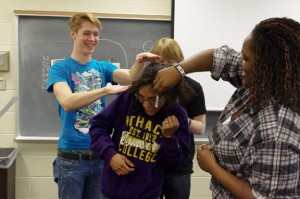At the center of a circle, a student stands alone, attempting to read a story to her peers. The surrounding group taunts and screams, doing everything it can to distract her. The simulation represents the struggle of living with ADHD. The purpose is to demonstrate diversity.

This activity is one of many a new student organization, Diversity in Action, at Ithaca College exercises in order to explore multiculturalism and create a stronger link between people of all backgrounds, colors and ideologies.
Eight freshmen founded the organization this December. The group aims to provoke discussions about diversity and acceptance on campus to help change students’ perceptions of themselves and their peers and ultimately end marginalization.
Freshman Krystel Weston, DIA’s founder, said she felt it was time for a truly multicultural group like DIA to be on campus.
“While I see the benefit of ethnicity groups here at Ithaca College, I also really, really felt the need for an open group for everyone that didn’t just talk about multiculturalism in terms of race and ethnicity,” she said.
At each meeting, Weston said the 15 group members discuss one of eight ideas of multiculturalism, including gender, socioeconomic status, belief systems, age, ability, race, ethnicity and sexual orientation. She said she hopes these themes promote challenging and provocative discourse.
Weston also said the members break into small groups for discussions and related activities. She said this encourages everyone to speak their minds and share their similarities and differences in order to bridge cultural gaps.
“In meetings we want to make our space as comfortable as possible and not censor anyone, because we see that so often we are limited by censorship,” she said.
Freshman Anjali Patel said she does not want the group’s title to prevent people from getting involved with DIA and learning about diversity.
“Just because we use the word diversity doesn’t mean it’s all going to be about underrepresented people,” she said. “It’s more about finding common ground.”
Freshman Tessa Crisman said she joined the group because she wanted to engage in well-rounded conversations about diversity.
“There tends to be a certain amount of racial tension on this campus because there are so few students of color,” she said. “It’s important to open up the dialogue in a non-racialized context so that you can be like, ‘Yes, we are different in many ways, but you can still talk about it.’ We can still talk through it.”
Both Weston and Patel said they want the students to understand that skin color does not determine who a person is.
“It goes back to the whole thing of letting people know that they have an identity outside of their race,” Weston said.
Paula Ioanide, assistant professor in the Center for the Study of Culture, Race and Ethnicity and faculty adviser for DIA, said she has high hopes for the group. She also said a progressive student organization like DIA will face adversity on campus.
“It’s going to be hard to sustain because most people don’t gravitate toward spaces that make them uncomfortable,” she said. “But if they do it well, it will become a hub for an incredible, incredible deepening of understanding and awareness that otherwise isn’t necessarily taking place in classrooms.”
Ioanide said it is hard for people to engage in these conversations because they highlight the privilege of certain groups of people.
Weston said this is why the group waited to discuss the race and ethnicity pillars until yesterday at its last meeting of the year.
“We didn’t want members to come in and talk about multiculturalism in the way they used to,” she said. “In the last meeting we will go over race and ethnicity and how they’re different.”
As the group brainstorms ideas for events to host next semester, Weston said DIA is just focused on starting healthy dialogue between the college’s student body and faculty. She said DIA’s goal is to encourage its members to take the group’s ideas back to the community and share them with others. She said this way everyone can learn more about multiculturalism, themselves and the people around them.
“There’s a lot more to you than just skin color, and there are a lot of things that you have in common with people,” Weston said. “Always understand that within your identity you are just as diverse as anyone else.”
Diversity in Action will begin its meetings again in the fall. To learn more about the group and how to get involved, visit
www.diversityinaction.weebly.com.




